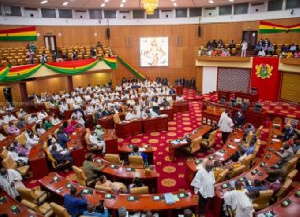- Home - News
- Polls
- Year In Review
- News Archive
- Crime & Punishment
- Politics
- Regional
- Editorial
- Health
- Ghanaians Abroad
- Tabloid
- Africa
- Religion
- Election 2020
- Coronavirus
- Photo Archives
- News Headlines
- Press Release
General News of Sunday, 14 November 2021
Source: GNA
MPs urged to contribute towards epidemic preparedness
Members of Parliament (MPs) have been urged to contribute a portion of their share of the Health Insurance Fund towards epidemic preparedness activities of the country.
Dr Hilarious Abiwu, the Deputy Northern Regional Director of Health in-charge of Public Health, who made the call, said this would ensure a reliable source of funds to support epidemic preparedness for early detection of diseases, adequate response and prevention from degeneration.
In a presentation at a regional stakeholders’ dialogue on epidemic preparedness, held in Tamale, Dr Abiwu called on regional and district coordinating councils to enact, modify and enforce appropriate legislation, including those for resource mobilization and allocation, to ensure funds were available to finance epidemic preparedness activities.
The Dialogue was organized by SEND Ghana, in partnership with Global Health Advocacy Incubator (GHAI), and attended by civil society organizations, Metropolitan, Municipal and District Assemblies, and District Health Management Teams drawn from the Northern Region.
Participants discussed funding and strategies towards sustained preparedness and response to now and future epidemics and allocations in the District Assemblies Common Fund for control measures at the sub-national levels.
The event formed part of activities under the Advocacy for Epidemic Preparedness Financing project funded by the GHAI by holding government accountable for the commitment it had made to prioritize and increase budgetary allocation to strengthen health infrastructure, equipment and human resources.
An epidemic is an outbreak of a disease that has the potential of spreading across various communities, districts, regions and the entire country.
It has been generally acknowledged that there is need for a reliable source of funds to undertake routine surveillance activities to prevent and or be adequately prepared against epidemics.
However, the country’s health system lacks the resources and adequate funding to undertake epidemic preparedness activities.
In view of this, any outbreak of a disease has serious consequences on the health of the people and the economy.
For instance, the recent outbreak of yellow fever in the Savannah Region has so far claimed 14 lives.
Mr Siapha Kamara, the Chief Executive Officer of SEND Ghana, lauded the collaboration of stakeholders, and said it showed their commitment towards a common purpose to improve epidemic preparedness.
He called on the citizenry to hold the government accountable to ensure the desired results were achieved.
Entertainment










